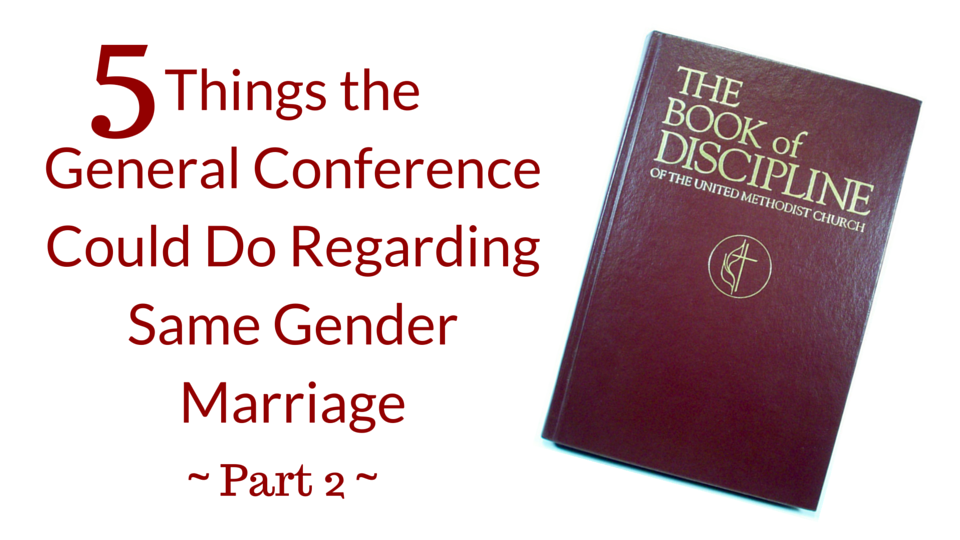A Hopeful Path Forward? – Part Three
Today’s post is Part Three in a series. You can read Part One here and Part Two here. This was a remarkable week at the United Methodist Church’s General Conference. It was clear as the delegates gathered in Portland that the debate about human sexuality was likely to consume a tremendous amount of time and energy. There were at least 56 petitions and pieces of legislation submitted by conservatives, progressives and moderates addressing same-gender marriage and the ordination of gay and lesbian people. Protests were planned by progressive groups. Some conservatives were preparing to call for the division of the denomination. On Tuesday of this week, the day before the human sexuality petitions were to be addressed before the delegates, a motion was made and approved by the delegates asking for the Council of Bishops to assert leadership on this issue. The motion passed with a strong majority. This was an historic event; it was the first time in the history of Methodism that a General Conference had made such a request of the Council of Bishops. The bishops accepted the challenge and mandate and had two special meetings. On Wednesday morning they brought forward to the body a response with specific recommendations. This document, which you can read here, was supported by the vast majority of bishops, including most of those in Africa. The recommendations included: The formation of a special Commission, named by the bishops, made up of representatives from across every region and the various perspectives in the sexuality debate. The possibility of a special called two- to three-day General Conference to meet prior to 2020 to address the issue. The deferral of all human sexuality legislation before the General Conference, referring it to the special Commission. The bishops would explore ways to “avoid further complaints” and trials while upholding the Discipline. After some intense debate, the delegates eventually passed a motion accepting these recommendations. With this vote, the General Conference deferred action on the most divisive issue at the conference and accepted the leadership of the bishops in finding a better way of working through the issue. Protests were called off. And delegates were free to focus on the mountain of other petitions that needed attention. So, did the bishops simply kick-the-can down the road as some suggested? Or did they assert real leadership, keep us from further harming each other, and offer us a mechanism that could help the United Methodist Church find a long-term solution to our differences over human sexuality, one that will allow us once again to focus on making disciples of Jesus Christ for the transformation of the world? I believe they did the latter. I believe their proposal is the best hope we have of moving away from the endless infighting, to find a genuine compromise that the majority of United Methodists can live with, and which may fundamentally reorder our life together as a church. There’s still anxiety around this proposal, mostly around who will serve on the Commission. I believe the bishops will earnestly choose recognized leaders from the various factions in the church who can ensure the plan addresses their concerns. In order for this effort to have a chance at success, the bishops and this Commission must find a long-term solution upon which all sides can agree. That solution may include a fundamental re-ordering of our life together as a people called Methodists. All of the options brought to this General Conference should be considered, as well as things no one has yet considered. There is a tremendous opportunity the bishops have been provided to “rethink church,” and I pray the Commission and the bishops take advantage of this. The work of the Commission will be challenging, with so many different voices around the table. There will be a continuing need for leadership from our bishops and whatever proposals come before a future General Conference must be ones which the bishops have stacked hands on and own as their proposal for the future of the United Methodist Church. Is it possible for the United Methodist Church to stay together? Yes, but it is also possible that some on either end of the theological spectrum may leave, no matter what. Some came to General Conference making plans to leave. But the vast majority of churches and pastors I have spoken with long for the unity the bishops speak of in their proposal. I pray that the bishops and Commission seize the opportunity to create a path forward that the vast majority of our churches can unify around. We are a church of the via media – the middle way – a church that values and holds together in tension ideas and impulses that seem like opposites. The United Methodist Church has been described as a church of the radical or extreme center. That extreme center is a place of tension, but it is also one of great spiritual depth and power precisely because it draws upon seemingly opposite impulses and holds them together. We are stronger because we have both liberal and conserving impulses. We have a more holistic approach to ministry because we hold together the evangelical and social gospel. We are better for insisting that we are a church of both the head and the heart. I would suggest that we need both the left and the right, and it is my prayer that the church’s bishops will help us find a way to live together maintaining “the unity of the Spirit in the bonds of peace.” Photo credit: Book of Discipline photo by Mike DuBose, UMNS

